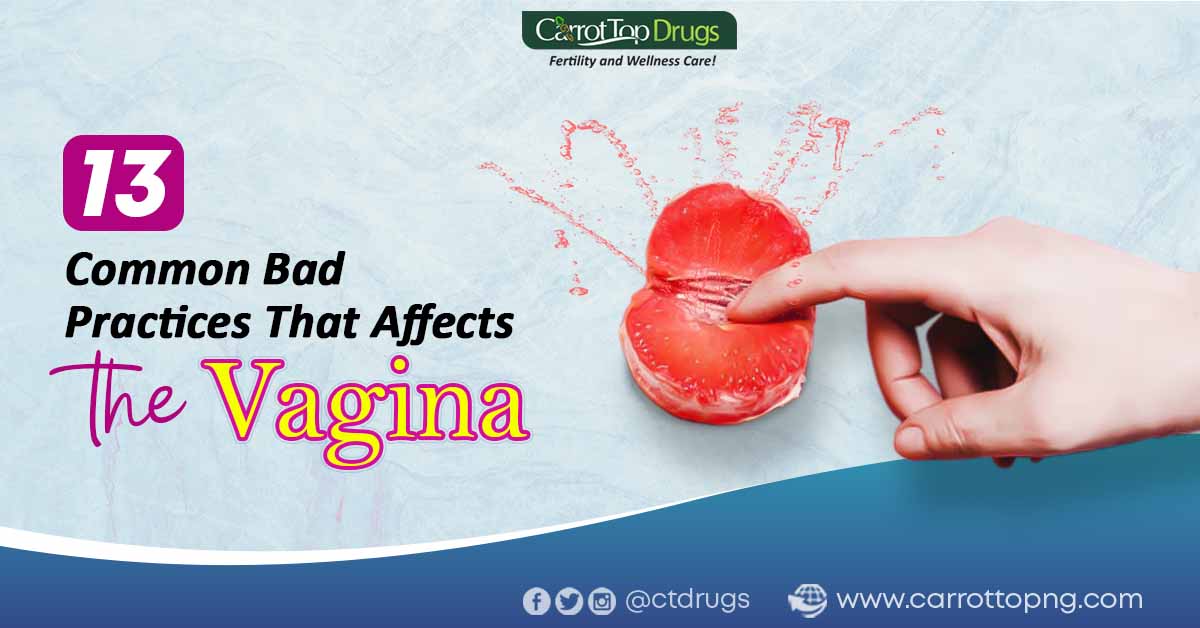The vagina is a delicate and important part of a woman’s body, and it requires proper care and attention to maintain its health. However, there are several common bad practices that can negatively affect the vagina and lead to discomfort, infections, and other issues. In this article, we will explore these practices and provide insights on how to avoid them. So, let’s dive in and learn more about the common bad practices that can affect the vagina.
Statistics
Research in 2014 showed that about 93% of women in Mumbai do not practice the best vaginal care. In a research journal published in November 2022, it was discovered that 81% of women had one vaginal infection or the other. The research was conducted with the cooperation of several institutions in Nigeria including UNILAG, LAUTECH, and OOU.
Women get infections when they do not take care of their vagina as they ought to and some are due to some common bad practices that affect the vagina. In this article, we will explore some of the bad practices that can affect the vagina and discuss how to maintain a healthy vaginal environment.
1. Wearing Tight Clothing
Wearing tight clothing, such as skinny jeans or synthetic underwear, for extended periods can have detrimental effects on vaginal health. These garments restrict airflow and create a warm, moist environment, which promotes the growth of harmful bacteria and yeast. As a result, women may experience discomfort, itching, and an increased risk of infections.
To protect the vagina, opt for loose-fitting, breathable clothing made from natural fabrics like cotton. This allows proper ventilation and reduces the chances of common bad practices that affect the vagina.
2. The Dangers of Harsh Cleansers on Vaginal pH Balance
Maintaining a healthy vaginal pH balance is crucial for optimal vaginal health. However, using harsh soaps, body washes, or cleansers on the vagina can disrupt this delicate balance.
The vagina has its own self-cleaning mechanism. Excessive cleansing with chemical-laden products can strip away the protective layer of natural bacteria and irritate sensitive tissues.
It is advisable to use mild, pH-balanced cleansers specifically formulated for the intimate area. By doing so, you can avoid common bad practices that affect the vagina and maintain a healthy pH balance.
3. Douching: A Harmful Practice That Disrupts Vaginal Flora
Douching is the practice of rinsing the inside of the vagina with a mixture of water and other substances. It is one of the common bad practices that affect the vagina.
Many women mistakenly believe that douching promotes cleanliness. But in reality, it can do more harm than good. Douching disrupts the natural balance of vaginal flora. These flora which consist of beneficial bacteria that help maintain a healthy environment.
This disruption can lead to an overgrowth of harmful bacteria or yeast. This increases the risk of infections such as bacterial vaginosis and yeast infections.
The vagina is designed to cleanse itself, and douching interferes with this natural process. It is best to avoid douching altogether to preserve the vaginal flora and prevent common bad practices that affect the vagina.
4. Not Practicing Safe Sex and its Impact on Vaginal Infections
Engaging in unprotected sex can have serious consequences for vaginal health. Sexually transmitted infections (STIs) can be transmitted through sexual contact, leading to various vaginal health problems. Unfortunately, this is one of the common bad practices that affect the vagina.
Common STIs that can affect the vagina include chlamydia, gonorrhea, trichomoniasis, herpes, and human papillomavirus (HPV). These infections can cause symptoms such as unusual discharge, itching, pain, and discomfort.
To protect the vagina, it is essential to practice safe sex by using barrier methods of contraception, such as condoms. Regular STI testing and open communication with sexual partners are also important steps in preventing and managing STIs and avoiding common bad practices that affect the vagina.
5. Ignoring Regular Check-ups: The Importance of Vaginal Health Monitoring
Regular gynecological check-ups play a crucial role in maintaining vaginal health. Ignoring regular check-ups is one of the common bad practices that can affect the vagina.
These check-ups allow healthcare providers to assess the overall health of the vagina, detect any potential issues early on, and provide appropriate treatment if necessary. During these visits, a healthcare professional may perform a pelvic examination, Pap smear, and other tests to screen for infections, abnormalities, or signs of conditions like cervical cancer.
Ignoring regular check-ups can lead to undiagnosed or untreated vaginal problems. It is recommended to schedule routine visits with a gynecologist or healthcare provider to monitor and address any concerns regarding vaginal health. By doing so, you can stay proactive in preventing and addressing common bad practices that affect the vagina.
6. The Hidden Risks of Fragranced Products on Vaginal Well-being
Using fragranced products on or around the vagina is one of the common bad practices that affect vaginal health. These products, including scented tampons, pads, sprays, and wipes, often contain chemicals and artificial fragrances that can irritate delicate vaginal tissues.
They can disrupt the natural pH balance and potentially lead to irritation, inflammation, and increased susceptibility to infections. It is advisable to opt for unscented, hypoallergenic products for menstrual hygiene and avoid using any fragranced products directly on the vagina.
By doing so, you can minimize the risks associated with common bad practices that affect the vagina.
7. Overwashing: When Cleanliness Goes Too Far
While maintaining proper hygiene is important for vaginal health, overwashing the vagina can be detrimental. Excessive washing, especially with harsh soaps or cleansers, can strip away the natural lubrication and beneficial bacteria that protect the vagina. This can lead to dryness, irritation, and an increased risk of infections.
It is best to limit vaginal washing to once or twice a day using mild, pH-balanced cleansers specifically designed for the intimate area. This allows for proper cleansing while preserving the natural balance and moisture of the vagina,
8. Using Unprotected Sex Toys: A Potential Threat to Vaginal Health
Sex toys can enhance pleasure and intimacy. But, using them without proper cleaning or protection can introduce harmful bacteria into the vagina.
It is crucial to clean sex toys before and after each use to remove any bacteria or residue. Warm water and mild soap or a toy cleaner can be used for cleaning.
Additionally, using a condom on the toy can provide an extra layer of protection. This helps prevent the transmission of bacteria and reduces the risk of infections.
By practicing safe and hygienic usage of sex toys, you can ensure the well-being of your vagina and avoid common bad practices that affect its health.
9. Poor Hygiene Habits and their Impact on Vaginal Comfort
Maintaining good hygiene habits is vital for vaginal health. Simple practices like wiping from front to back after using the toilet help prevent the spread of bacteria from the anal area to the vagina.
It is also important to wash hands before any intimate contact to minimize the risk of infections. Neglecting proper hygiene practices can increase the chances of bacterial growth and infections, leading to discomfort and irritation.
By adopting good hygiene habits, you can maintain the cleanliness and well-being of your vagina, and avoid the common bad practices that affect it.
10. Dehydration
Staying hydrated is beneficial for overall health, including vaginal health. Drinking an adequate amount of water helps maintain proper hydration levels in the body, including the vaginal tissues. Sufficient hydration can prevent dryness and support the natural lubrication of the vagina.
When the body is dehydrated, the vaginal tissues may become dry and susceptible to irritation and discomfort. By ensuring you drink enough water throughout the day, you can promote vaginal health and prevent the negative effects of common bad practices.
11. Unsanitary Menstrual Products: A Recipe for Vaginal Infections
During menstruation, using unsanitary or low-quality menstrual products can increase the risk of vaginal infections.
It is essential to choose high-quality pads, tampons, or menstrual cups and change them regularly as recommended by the manufacturer. This helps maintain cleanliness and prevents the growth of bacteria.
Additionally, it is crucial to follow proper hygiene practices when handling and disposing of menstrual products. By using hygienic and reliable menstrual products, you can protect your vagina from potential infections caused by common bad practices.
12. Excessive Use of Antibiotics and its Effect on Vaginal Microbiome
While antibiotics are sometimes necessary to treat bacterial infections, excessive or unnecessary use can disrupt the natural balance of bacteria in the vagina. This can lead to an overgrowth of yeast or other harmful bacteria, resulting in conditions such as yeast infections or bacterial vaginosis.
It is important to take antibiotics only when prescribed by a healthcare professional and to complete the full course of treatment. If you experience recurrent vaginal infections after antibiotic use, consult with your healthcare provider to explore appropriate preventive measures and alternative treatments.
By using antibiotics judiciously, you can maintain a healthy vaginal microbiome and prevent the negative impact of common bad practices.
13. Ignoring Signs of Infection: The Importance of Early Intervention
Ignoring signs of vaginal infection, such as unusual discharge, itching, or foul odor, can allow the infection to worsen. It is important to pay attention to any changes in vaginal health and seek medical attention if any concerning symptoms arise.
Early detection and treatment can prevent complications and help restore vaginal health. If you experience persistent or recurring symptoms, such as discomfort, itching, or an abnormal discharge, consult with your healthcare provider for a proper diagnosis and appropriate treatment. By addressing vaginal infections promptly, you can mitigate the risks.
Conclusion
Taking care of vaginal health is essential for overall well-being. By avoiding common bad practices that affect the vagina, women can maintain a healthy balance and reduce the risk of discomfort, infections, and other issues.
It is crucial to prioritize hygiene, use gentle and pH-balanced products, practice safe sex, and seek medical attention for any concerning symptoms. By adopting these practices, women can promote optimal vaginal health and enjoy a comfortable and thriving lifestyle.
We also recommend that women take supplements that can boost their immunity and keep the vagina healthy like EVERGREEN CM and EVERGREEN FORMULAR FOR WOMEN.
FAQs
1. How can tight clothing affect vaginal health?
Wearing tight clothing restricts airflow and creates a warm, moist environment, which promotes the growth of harmful bacteria and yeast. This can lead to discomfort, itching, and an increased risk of infections.
2. Is douching recommended for vaginal cleanliness?
No, douching is not recommended. It disrupts the natural balance of vaginal flora and can lead to the overgrowth of harmful bacteria or yeast, increasing the risk of infections.
3. Can fragranced products be used on the vagina?
Using fragranced products on or around the vagina is not recommended. These products can contain chemicals that irritate delicate tissues and disrupt the pH balance, leading to irritation, inflammation, and increased susceptibility to infections.
4. How often should I wash the vagina?
It is best to limit vaginal washing to once or twice a day using mild, pH-balanced cleansers specifically designed for the intimate area. Overwashing can strip away natural lubrication and beneficial bacteria, leading to dryness, irritation, and an increased risk of infections.
5. Why is staying hydrated important for vaginal health?
Staying hydrated helps maintain proper hydration levels in the body, including the vaginal tissues. Sufficient hydration prevents dryness and supports the natural lubrication of the vagina, reducing the risk of discomfort and irritation.

















